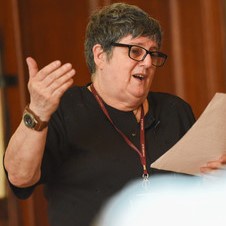Friday 19th May, 12 noon - 6pm
Sir Duncan Rice Library, University of Aberdeen
FREE
Includes lunch and refreshments
The Confucius Institute of the University of Aberdeen is hosting a free one-day event focusing on Chinese translation run in conjunction with Wuhan University and Paper Republic. This event is aimed at professional translators, and anyone interested Chinese literary translation.
Register your place online.
If you have any questions about this event, contact us at confucius@abdn.ac.uk.

- Programme
-
Session 1
Xiong Wei
Translatability and Untranslatability: A Perspective of Chinese Traditional Linguistic Philosophy
The issue of “translatability” and “untranslatability” haunts the history of translation studies, which generally involves a pendulum movement between them. To some extent, this issue stems from different understandings of the nature of language. Chinese traditional culture understands the nature of language in diversified ways. The Confucian idea of “rectification of names” and “names are made to denote actualities” emphasizes the unity of name and actuality; the Taoist idea of “speaking the unspeakable” and “forgetting the language once getting the meaning” accentuates the separation of name and meaning; the Buddhist idea of “text prajna” and “transmission without recourse to language” focuses on the use and abandonment of name and form. Through the prism of these linguistic insights, a continuum of changes from translatability (Confucianism), to semi-translatability/untranslatability (Buddhism), then to untranslatability (Taoism) has been presented. The Chinese traditional linguistic philosophy may shed new light on some core issues of translation studies.
Nicky Harman
The Journey of a Story
Nicky will talk about her recent translation, Huang Beijia's Flight of the Bumblebee, a YA novel (for ages 11-15) about a family of children growing up in wartime, sharing how she came across the novel and was asked to translate it. She will also discuss some of the historical background to the book and the challenges of translation and Huang's style.
Session 2
Translation Slam
Translation in Action: How Two Translators Approach the Translation of a Chinese Short Story
Nicky Harman and Jack Hargreaves go head-to-head on a text, producing two very different translations and each trying to persuade you that theirs is best. Which one do you prefer and why? How would you have done it? Whose approach might you use in your own translations in the future? These are all questions you can answer at this event and Q&A.
Session 3
Brian Holton
Translating 300 Song Ci into Scots and English
Brian will talk about his work translating Aa Cled Wi Clouds She Cam - 60 Lyrics frae the Chinese. In China, the 300 Song Ci is the standard anthology for high school and undergraduate students. This book introduces Scots (and English) speakers to one of the major genres of Chinese lyric verse. This genre appeared in the ninth century, during the late Tang Dynasty, but is generally considered to have reached its full flowering in the following Song Dynasty (960-1279CE).
Among the most elegant and beautiful texts written in any language, these lyrics are of particular interest in that they demonstrate the multum in parvo (less is mair) principle: like Chinese calligraphy or landscape painting, great and subtle effects result from a high artfulness that looks artless. The two main schools of Song Ci are the heroic (haofang) and the delicately restrained (wanyue). They are also technically interesting, each being written to the irregular metrical structure of one of a selection of 800-odd models, each of which was derived from an existing song form, often from Central Asia. The authors include masters such as Fan Zhongyan (989-1052), Ouyang Xiu (1007-1072), Liu Yong (987-1053), and Yan Jidao (1031-1106), as well as lesser-known writers.
Sheena Blackhall
Chinese Dragon meets Loch Ness Monster: Translations, Stories, and Original Poems
A poetry reading from local North East writer, traditional ballad singer and storyteller Sheena Blackhall. Sheena will read a selection of her original poems and translated poems from Chinese into Scots.
- People
-

Sheena Blackhall is a writer, illustrator, traditional ballad singer and storyteller in North East Scotland. From 1998-2003 she was Creative Writing Fellow in Scots at the Elphinstone Institute. She has published four Scots novellas, fifteen short story collections and over 187 poetry collections. In 2009 she became Makar (poet laureate) for Aberdeen and the North East, and Makar for the Doric Board in 2019.


When not translating, she spends time promoting contemporary Chinese fiction to the English-language reader. She co-runs and is a trustee of the registered non-profit Paper Republic; runs literary events and writes blogs; and gives talks at literary festivals and, especially, the Centre for New Chinese Writing at Leeds University.

His collection of classical Chinese poetry in Scots, Staunin Ma Lane, was published by Shearsman Books in 2016, and his Hard Roads an Cauld Hairst Winds: Li Bai an Du Fu in Scots was published by Taproot Press in 2022. His Scots translations of Song Dynasty lyrics, Aa Cled Wi Clouds She Cam, is coming from Irish Pages in Summer 2022.
He makes regular appearances at conferences and literary festivals, and has lectured at universities in the UK, Europe, the USA, Canada, New Zealand, Hong Kong, China, and elsewhere. He has won prizes for his translations, and for his own original poetry.

